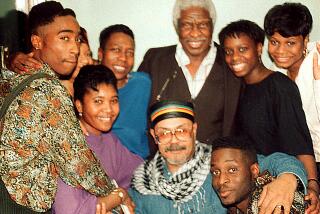Book review: ‘Great Soul,’ a Gandhi biography by Joseph Lelyveld
- Share via
“I do not accept the claim of saintliness,” said Mohandas Gandhi in 1920, when he had not yet been given the spiritual title of “mahatma.” “I am prone to as many weaknesses as you are.”
These words are quoted at the very outset of “Great Soul,” and author Joseph Lelyveld is quick to warn his readers that he does not intend to write about the iconic Gandhi that we all think we know. Rather, he proposes to “follow him at ground level as he struggled to impose his vision on an often recalcitrant India” and to focus on “incidents and themes that have often been underplayed.” The author is after “real history,” he announces, rather than “heritage mythmaking.”
Lelyveld, a former editor of the New York Times as well as a foreign correspondent for the paper, was awarded a Pulitzer Prize for the book “Move Your Shadow: South Africa, Black and White” (1985). He spent time as a correspondent in South Africa, where Gandhi started out as a callow 23-year-old “briefless lawyer,” and India, where Gandhi arrived at age 44 as a political figure of influence and consequence and where he was dubbed a mahatma (“great soul”) by the poet Rabindranath Tagore.
“Gandhi kept changing, experiencing a new epiphany every two years or so,” writes Lelyveld, “each representing a milestone on the path he was blazing for himself.” He drifted away from his family and dressed in the garb of a Hindu holy man, “but he would always be the opposite of a dropout.” Rather, Gandhi variously reincarnated as a “[s]age, spokesman, pamphleteer, agitator, seer, pilgrim, dietitian, nurse and scold.” Indeed, he spoke of himself as “a scavenger, a spinner, a weaver, a farmer and a laborer”) as a way of declaring his disdain for distinctions based on color, class or caste.
Lelyveld wants us to understand Gandhi as a radical and a revolutionary in the context of his time and place even if “the political Gandhi” tends to be eclipsed by “the religious Gandhi.” Above all, he directs our attention to the role of South Africa in shaping his morality and his politics, a fact that explains why V.S. Naipaul called him “[t]he least Indian of Indian leaders.” Thus, for example, the author insists that “musing about India while living in South Africa and reading Tolstoy” is what created Gandhi’s social conscience in the first place.
Along the way, Lelyveld focuses on episodes in Gandhi’s life that figure importantly in the making of the man even if they are not prominently featured in the myth that he now inhabits. During the Boer War, for example, Sgt. Maj. Gandhi was in charge of the stretcher-bearers who served at the fighting front at the same time that a young Winston Churchill was reporting on the war as a newspaper correspondent: “Gandhi and Churchill were seldom again on the same side,” observes the author. Ironically, Gandhi cherished the memories of his military service and “habitually used martial metaphors to summon the valor of his volunteers for nonviolent resistance.”
One episode in Lelyveld’s book has resulted in a flurry of media attention and the banning of his book in at least one Indian state — an account of Gandhi’s friendship with German-Jewish architect Hermann Kallenbach, which the author calls “the most intimate, also ambiguous, relationship of his lifetime.” Lelyveld has denied that he meant to characterize them as lovers, and his book quotes one Gandhi scholar to the effect that their relationship was “‘clearly homoerotic’ rather than homosexual.” Still, it is a bit shocking to come across a brief discussion of the possible uses of Vaseline in this otherwise sober and restrained work.
Some of the events that attract Lelyveld’s attention date back more a century, but they cast a long shadow over more recent history. A young Nelson Mandela was impatient with lectures on “the ethical discipline of satyagraha” — Gandhi’s term for his doctrine of nonviolence — when the African National Congress and the South African Indian Congress agreed to cooperate in 1952 in opposing apartheid. Gandhi, the author observes, “never had to face the kind of retaliation the Afrikaner nationalist regime now rolled out in the form of repressive new security laws.” Yet Lelyveld insists that “Gandhi was indeed a founding father in the country he adopted temporarily, as well as in his own.”
Among the most remarkable moments in Lelyveld’s book are those in which he examines Gandhi’s goal of Muslim-Hindu unity, which is “hard to imagine in an era in which predominantly Hindu India and predominantly Muslim Pakistan confront each other as nuclear powers.” Muslim votes were necessary for the adoption of Gandhi’s program of “non-cooperation” at a meeting of the Indian National Congress in 1920, and one of his allies “took the precaution of rounding up a flying force of burly ‘volunteers,’ Muslims uncommitted to nonviolence, to face down any anti-Gandhi demonstrators.” In the end, of course, Gandhi failed to achieve a merger between the Hindu and Muslim movements, but he came close to “the mirage of one.”
“Yet from a distance of more than seven decades,” writes Lelyveld in a different context, “what stands out is the commitment rather than the futility.”
In a sense, “Gandhi” is a gloss on its subject’s life rather than a conventional biography, but there is nothing abbreviated about the book. Lelyveld shows us Gandhi in tight close-up, and he places the man in various frames of reference — social, political and religious — that allow us to understand and appreciate him not as a plaster saint but as a flesh-and-blood human who wrote himself into history, and not only because of his shimmering vision of a more perfect world but also because of his sheer force of will.
Kirsch is the book editor of the Jewish Journal and the author of, most recently, “The Grand Inquisitor’s Manual: A History of Terror in the Name of God.”
More to Read
Sign up for our Book Club newsletter
Get the latest news, events and more from the Los Angeles Times Book Club, and help us get L.A. reading and talking.
You may occasionally receive promotional content from the Los Angeles Times.







